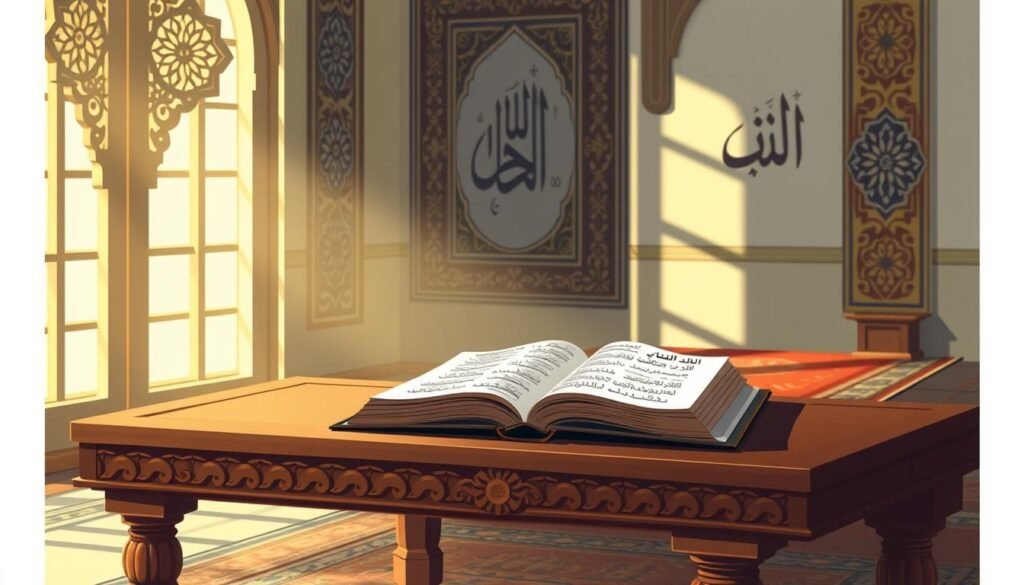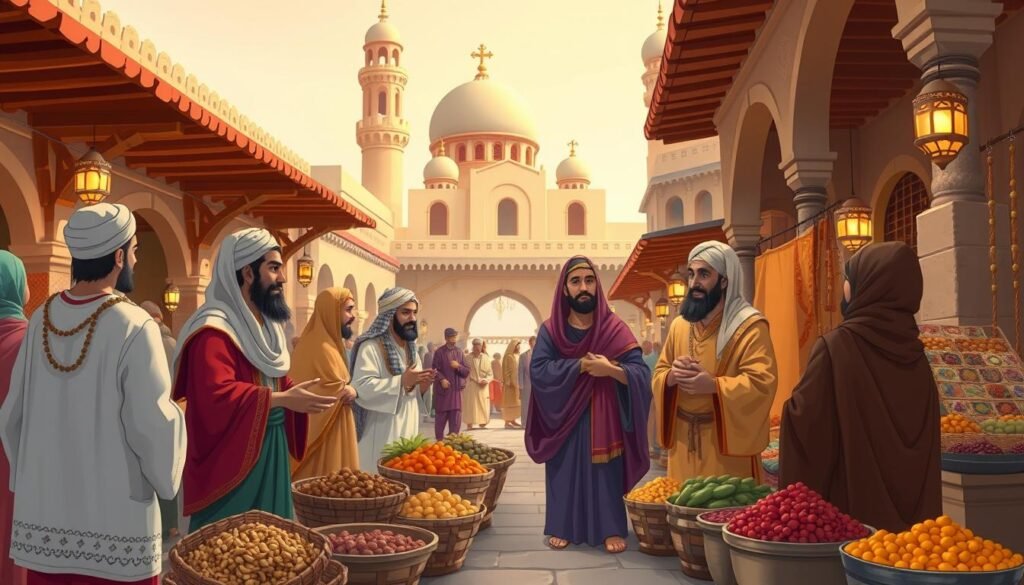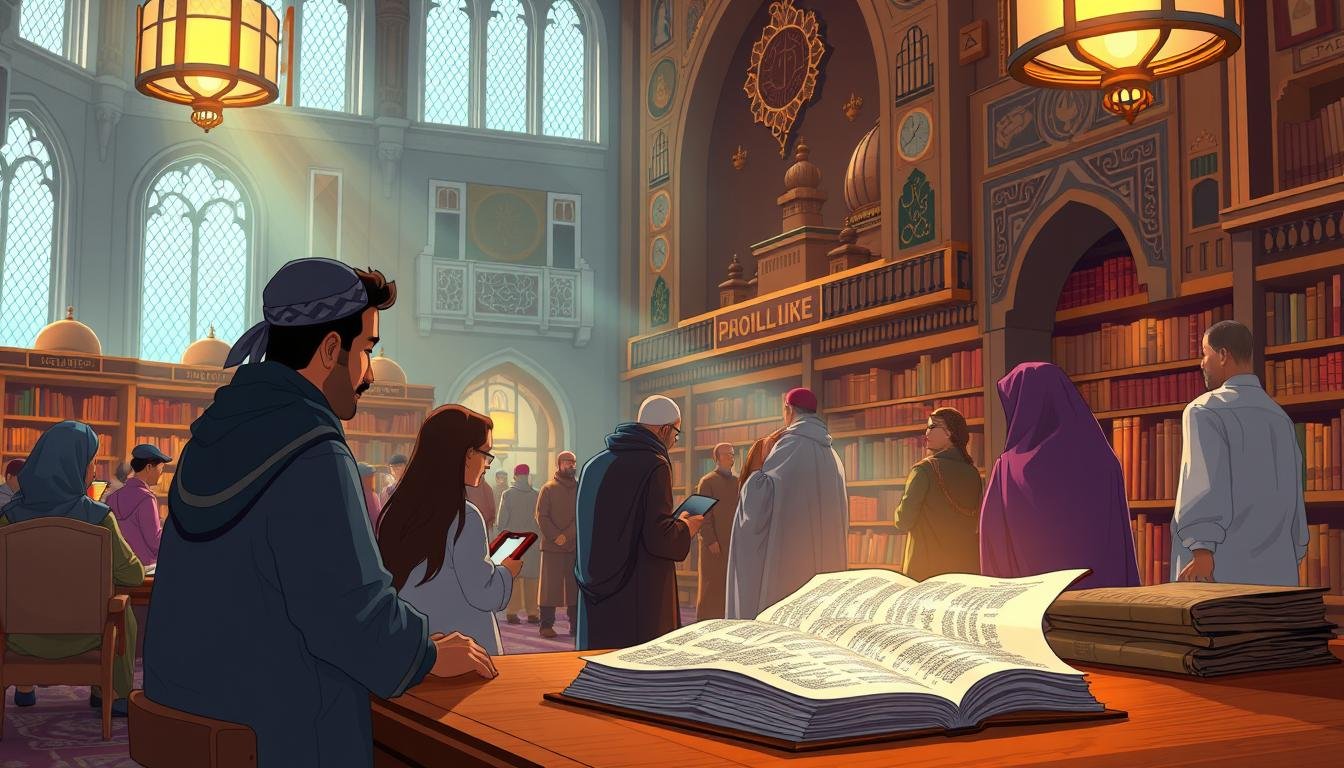Have you ever wondered why Muslims are often told not to read the Bible? This is despite the Quran mentioning earlier revelations. This question makes us think about interfaith dialogue and religious texts.
When we ask if Muslims can read the Bible, we need to look at Islamic views on it. The Quran says it is the final word, not the Bible. This shows how scripture is seen as a source of truth.
It’s interesting to see how the Gospel and the Torah fit into this view. They are part of the religious tapestry, but the Quran is seen as the ultimate guide.
Understanding Islamic Views on Other Holy Texts
Islamic views on other holy texts are complex. They see the Quran as the final word. They also recognize earlier scriptures like the Tawrat, Zabur, and Injil.
In the early days, Prophet Muhammad told Muslims not to read the Bible. He wanted to keep things clear and avoid confusion.
But the Quran later says it’s okay to look at other scriptures. It tells believers to check the Torah and understand the past revelations. The Quran says it confirms these earlier texts, showing a connection between them.
Many people who changed their faith from Judaism or Christianity say the Quran is clear. Muslim scholars study the Bible to see how it compares to the Quran. They look at both similarities and differences.
Even though many Muslims think the Bible has been changed, there are different opinions on this. It’s a topic of ongoing discussion.
The Bible and its Components
The Bible is key in Christianity, made up of parts that show its deep meaning. It has the Old Testament and the New Testament. Each part tells stories that help us understand religious history and moral lessons. Looking into these parts helps us see their importance and how they relate to Islamic beliefs.
Overview of the Old Testament
The Old Testament is also known as the Hebrew Scriptures. It has lots of religious history, laws, and important events for Jews and Christians. It includes books of history, poetry, and prophecy that show God’s relationship with people over time.
For Muslims, the Old Testament is important because it talks about Moses and David. This shows its value next to the Quran. Learning about these parts helps us see the links and differences between these sacred texts.
Overview of the New Testament
The New Testament is all about Jesus Christ’s life and teachings. It has the four Gospels, letters from Paul, and other writings. These texts shape Christian beliefs and morals.
For Muslims, Jesus is a key prophet, but the New Testament’s views might differ from theirs. Exploring these texts helps us understand the growth of religious ideas and Jesus’s role in both faiths.
Can Muslims Read The Bible?
Reading the Bible sparks interesting talks in the Islamic world. Many experts say it’s good to read the Bible. They see it as a way to learn more about different religions.
They believe in curiosity and wanting to know more. This is something Islam values a lot. So, looking into other books can be a way to grow in knowledge.
Some old views might be careful, but many new scholars think differently. They say reading the Bible helps us talk to people from other faiths. It helps us understand different cultures better.
They think it’s okay because Islam values learning a lot. The Quran talks about old messages, which could be a good start to reading the Bible.
If you want to learn more about Jesus in Islam, check out this article. It talks about Jesus and his role in Islam. It shows how both faiths can find common ground through respectful talks.

Islamic Perspectives on the Bible
Islam and the Bible have a complex relationship. The Quran teaches us about this bond. It shows respect for old revelations but also points out differences.
This understanding is key to bringing people together. It helps close the gap between communities.
Quranic References to Previous Revelations
The Quran talks about the Torah and the Gospel. It sees them as vital parts of God’s message. It calls the Quran a Muhaymin, a guardian that confirms these truths.
But it also warns about changes to these texts. For example, Surah 2, Verse 79 talks about those who alter religious writings for their own gain. This encourages Muslims to study the Bible with a critical eye.
Interfaith Understanding and Respect
Reading Christian texts can lead to better understanding between faiths. Events like conferences on “Reading the Bible in the Context of Islam” help. They bring Muslims and Christians together.
These gatherings help people see things from each other’s point of view. They build respect. By working together, we can find common ground and build strong relationships.
The Concept of Abrogation in Islam
The idea of abrogation, or naskh, is key to understanding Islamic teachings. It means later parts of the Quran can change what came before. This idea shapes how Muslims see other religious texts, like the Bible.
Abrogation changes how we read scriptures. It tells us which teachings are important and which are not anymore.
Implications for Reading Other Scriptures
When we look at abrogation and the Bible, we see different views among scholars. The Quran mentions seven times that the Bible has been changed. This makes reading the Bible from an Islamic view hard.
Stories from Sahih al-Bukhari also show that followers of other scriptures have made changes. This makes people doubt the Bible’s true words.
Exploring abrogation, we find important Quranic verses. For example, Surah al-Ma’idah says Jesus followed Moses’ Law. This shows Jesus’ teachings were different from the Gospels.
Other verses talk about important beliefs. They say no one can claim to be God. This shows the Bible’s teachings are not always the same as Islamic ones. It makes Muslims think carefully about the Bible, respecting Islamic teachings while also talking to other faiths.
Historical Interactions Between Muslims and Christians
The history of Muslims and Christians shows a mix of conflict and cooperation. Times like the Crusades and Reconquista saw big fights. But, these hard times also had moments of religious talks.
Scholars from both sides worked together, sharing ideas and views. This led to a deeper understanding of each other’s beliefs.
They learned more about each other’s holy books. Muslims saw the Bible’s importance to Christians. Christians also saw the Qur’an’s role in Islam.
This understanding helped start ongoing talks between them. The Qur’an talks about the People of the Gospel, showing respect for the Bible.

Today, these talks show a wish to understand and respect each other. Both faiths believe in divine guidance, but see it differently. Despite past fights, there’s hope for better relations.
These talks are key today. They help us live together better. They show us how to get along, even with our differences.
The Methodology of Tafsir Al-Qur’an Bi-l-Kitab
Tafsir Al-Qur’an Bi-l-Kitab is a key method in Islamic studies. It uses Biblical texts to understand the Quran. This helps scholars see how the Quran relates to earlier scriptures.
By looking at both similarities and differences, scholars get deeper insights. This approach helps them understand the stories of Islam and Christianity better.
Interpreting the Quran through Biblical Texts
The Quran and Biblical texts have deep connections. Scholars like Abu al-Hakam Abd al-Salam bin al-Isbili have shown this. They find links between the Quran and the Torah, Psalms, and Injil.
This method shows how the Quran respects earlier scriptures. It helps bridge gaps between cultures and beliefs. It also shows the Quran’s role as the final message from God.
Views on the Preservation and Alteration of Scriptures
In Islamic theology, keeping scriptures safe is very important. The Quran talks about how some texts have been changed over time. It warns against changing divine texts, pointing out that humans have altered them.
Islamic scholars have talked a lot about text changes. Ibn Taymiyyah and Al-Qadi Ismail b. Ishaq have discussed how words can be misinterpreted. Al-Baji’s work on Muwatta’ Maalik shows how small changes can change what we understand.
Camilla Adang from the West says the Quran talks about more than just the Hebrew Bible. It includes other Jewish texts. This shows Muslims need to be careful when reading the Bible. They believe in the Quran’s message while respecting other traditions.
Scholarly Opinions on Muslims Reading the Bible
Many Islamic scholars advise caution when Muslims read the Bible. They warn of possible misunderstandings due to changes in Jewish and Christian texts. Muslims often believe these texts have been altered a lot.
A lot of Muslims are not friendly towards Christianity or the Bible. This makes them hesitant to read these texts. Before Muslims start reading the Bible, they need to prepare well.
The book of Proverbs is often talked about when discussing faiths. It offers wisdom that many, including Muslims, find valuable. Solomon, known in both the Qur’an and Christian traditions, is a key figure. Muslims might not know much about Solomon’s writings.
Studying the Bible has become more common, thanks to the Enlightenment. Many Islamic scholars now compare the Qur’an and biblical texts. Works like “The Quran & the Bible: Text and Commentary” by Gabriel Said Reynolds help in this study. They show the similarities and differences between the two texts.
Even though scholars are curious, the Qur’an is seen as enough for Muslims. Yet, some Islamic scholars might read the Bible to clear up misunderstandings. The debate shows the complexity of the issue, with both risks and opportunities for understanding between faiths.
The Role of Interfaith Dialogue
Interfaith dialogue is key in bringing people from different religions together. It helps them understand each other better. By talking respectfully, they can find things they have in common.
This way, they can clear up wrong ideas and work together. It builds trust and cooperation.
Promoting Mutual Understanding
Interfaith dialogue helps people from different backgrounds talk meaningfully. In places like Dearborn, Michigan, with a big Muslim population, there are many chances to meet. The Islamic Center of America, the biggest Shia mosque, often invites Christians and Muslims to share their beliefs.
These events help people learn about each other’s traditions and sacred texts. It builds respect and opens doors for working together.
Examples of Interfaith Cooperation
There are many examples of interfaith work doing well. Eide Alawan leads tours at the Islamic Center and shares stories of deep conversations. People are curious about Islam and want to learn more about shared values.
These talks often happen near Christian churches, making it easier for people to get involved. Muslims and Christians can work together on projects like community service or educational workshops. This way, they can tackle social issues together.
Conclusion and Reflections on Religious Tolerance
Exploring how Muslims view the Bible shows us how important religious tolerance is. It shows us the value of respecting each other’s beliefs. By understanding the different views within Christianity, we can talk more openly between faiths.
Looking at the Bible from an Islamic point of view helps us feel closer to each other. It helps us see the common human experiences we share. This can make our understanding of each other deeper.
Islam’s core beliefs, like believing in one God and following the five pillars, encourage us to learn about other faiths. Muslims can study the Bible while keeping their own beliefs. This way, we all learn more about each other’s faiths.
Seeking common ground through talking between faiths can break down barriers. It helps us see beyond stereotypes. By focusing on what we share, like kindness and community, we can build a more welcoming world.
Learning from each other helps us create a place where everyone is valued. We can celebrate our differences and treat each other with respect. This is key to living together peacefully today. For more on embracing diversity within the Muslim community, consider exploring this insightful article on racial inclusivity.
FAQ
Can Muslims read the Bible?
What are the Islamic views on other holy texts?
What are the components of the Bible?
What is the significance of reading the Bible from an Islamic perspective?
How does the Quran reference earlier revelations?
What is the concept of abrogation in Islam?
What have been the historical interactions between Muslims and Christians?
What is Tafsir Al-Qur’an Bi-l-Kitab?
What is the Islamic view on the preservation and alteration of scriptures?
What are the scholarly opinions regarding Muslims reading the Bible?
How does interfaith dialogue contribute to mutual understanding?

Embracing Faith, One Insight at a Time!
The teachings of the Quran have always guided my path. With a deep passion for Islamic knowledge, I strive to blend the wisdom of tradition with the relevance of today, making the timeless messages of Islam accessible and meaningful for everyone.
Muslim Culture Hub is my platform to share historical insights and thought-provoking articles, exploring both well-known and lesser-discussed aspects of Islamic culture and beliefs. My mission is to create an inclusive online space where everyone can learn, strengthen their faith, and connect with the profound message of Islam.
Join the journey!
May peace be upon you.








